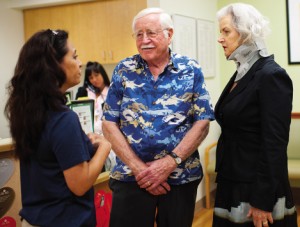
“The case manager was excellent in preparing us for the care that my mother needed. She went beyond the call of duty.”
“I want you to know how grateful we are and how wonderfully helpful, supportive and resourceful your social worker has been — above and beyond, and a tribute to you and the hospital.”
These notes of mahalo come from patients and family members who are thankful for quality care they received during what can be a very complex situation — hospital discharge and preparing for the tasks of at-
Hospitals throughout Hawai‘i follow strict guidelines set forth by the Centers for Medicare & Medicaid Services and The Joint Commission, for training caregivers — with the goal of ensuring the patient’s safety and well being.
Last year, Consumer Reports Magazine rated Straub Clinic and Hospital as the safest hospital in Hawai‘i. Specifically noted were a low medical mortality, avoidance of infections and the state’s lowest surgical mortality rate.
Developing a culture of safety requires constant communication among physicians, nurses and everyone involved in the patient’s treatment team. From the moment a patient enters the hospital, a nurse assesses the patient’s support system, residence and daily activities. A hospital case manager also determines any special transition needs, based on individual diagnosis and recovery.
If a patient is incapable of or uncomfortable with administering their own necessary at-
If none are identified, the case manager will discuss home care visits or short-
At-
 Communication continues with a review of all at-
Communication continues with a review of all at-
By communicating and working with patients’ and caregivers’ educational needs from admission through recuperation, we are able to better provide a safe environment for the patient, both at the hospital and at home.
Straub Clinic & Hospital
808-522-4000 | info@straubhealth.org
straubhealth.org


Leave a Reply